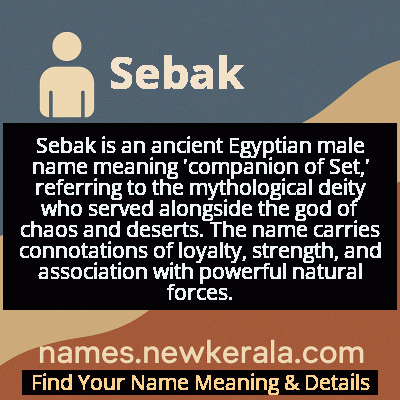Sebak Name Meaning & Details
Origin, Popularity, Numerology Analysis & Name Meaning of Sebak
Discover the origin, meaning, and cultural significance of the name SEBAK. Delve into its historical roots and explore the lasting impact it has had on communities and traditions.
Name
Sebak
Gender
Male
Origin
Egyptian
Lucky Number
2
Meaning of the Name - Sebak
Sebak is an ancient Egyptian male name meaning 'companion of Set,' referring to the mythological deity who served alongside the god of chaos and deserts. The name carries connotations of loyalty, strength, and association with powerful natural forces.
Sebak - Complete Numerology Analysis
Your Numerology Number
Based on Pythagorean Numerology System
Ruling Planet
Moon
Positive Nature
Diplomatic, friendly, artistic, empathetic.
Negative Traits
Over-sensitive, moody, indecisive, prone to self-pity.
Lucky Colours
Green, cream, white.
Lucky Days
Monday.
Lucky Stones
Pearl, moonstone.
Harmony Numbers
1, 3, 4.
Best Suited Professions
Diplomats, mediators, caregivers, artists.
What People Like About You
Cooperative spirit, friendliness, artistic talent.
Famous People Named Sebak
Sebak
Mythological Figure
Companion deity to Set in Egyptian mythology
Sebak-hotep
Ancient Egyptian Official
High-ranking official during the 13th Dynasty
Sebak-em-hat
Priest
Temple priest dedicated to Sobek cult
Name Variations & International Equivalents
Click on blue names to explore their detailed meanings. Gray names with will be available soon.
Cultural & Historical Significance
As Set's companion, Sebak represented the destructive but necessary forces of nature that the Egyptians both feared and respected, embodying the concept that chaos and order were complementary forces in the universe rather than purely oppositional. This theological understanding reflects the sophisticated Egyptian worldview where even seemingly negative forces had their place in maintaining cosmic balance. The preservation of Sebak's name in archaeological records indicates that this deity held enough significance to be memorialized in formal religious contexts, though always in a secondary role to the more prominent Set.
Extended Personality Analysis
Individuals named Sebak are often perceived as possessing strong, determined personalities with a natural leadership quality. They tend to be independent thinkers who aren't afraid to challenge conventional wisdom or take unconventional paths. Like their mythological namesake who served as a companion to the powerful god Set, people with this name often demonstrate loyalty to their chosen companions and causes, while maintaining a certain mysterious or enigmatic quality that can be both intriguing and intimidating to others.
They typically exhibit resilience in facing challenges and have the ability to thrive in difficult circumstances, much like the desert environment associated with their mythological counterpart. This resilience often manifests as practical problem-solving skills and the capacity to remain calm under pressure. However, they may also struggle with balancing their strong will with cooperation and may need to consciously develop diplomatic skills to avoid conflicts that could arise from their direct and sometimes uncompromising approach to achieving their goals.
Modern Usage & Popularity
In contemporary times, Sebak remains an extremely rare given name, primarily used by enthusiasts of Egyptian history and mythology or within families seeking unique, culturally significant names. The name sees occasional use in academic circles focused on Egyptology and among communities interested in reviving ancient naming traditions. It has not appeared on popular baby name charts in any significant capacity, maintaining its status as a distinctive and specialized choice. The name's association with ancient Egyptian deities makes it particularly appealing to parents interested in mythological or historical names that carry deep cultural resonance without being overly common. Its rarity ensures that individuals named Sebak are likely to have a unique identity, though they may frequently need to explain the name's origin and pronunciation to others.
Symbolic & Spiritual Meanings
Symbolically, Sebak represents the necessary chaos that precedes creation and the untamed forces of nature that exist beyond human control. The name carries connotations of loyalty to powerful forces, companionship in challenging circumstances, and the strength found in harsh environments. Like the desert that was central to Set's domain, Sebak symbolizes resilience, adaptation, and the ability to find purpose in seemingly inhospitable conditions. The name also embodies the ancient Egyptian understanding of duality—where chaos and order, destruction and creation, are interdependent forces rather than simple opposites. This symbolic complexity makes the name rich with metaphorical meaning, representing the idea that supporting roles can be as crucial as leading ones, and that strength often comes from understanding and working with powerful, sometimes dangerous, natural forces.

